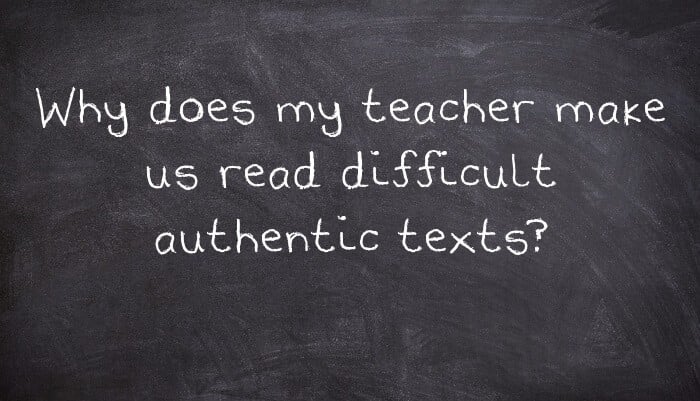While most students want to be able to read an authentic text such as a real newspaper article, even very Advanced level learners can find reading it in the limited time given in class a challenge. Some students therefore wonder why the teacher doesn't give difficult texts for homework when students have more time to read it slowly or just give easier texts.
If you think your teacher should give you easier texts, you could be right!
Most teaching experts agree that carefully graded texts are usually better for language learning. If you are in a special position such as needing to read articles for your work or studies, however, you might need lots of help reading properly. Reading slowly with a dictionary at home is not the best way of learning good reading skills.
Even if you don't have a special reason to read in English, there are good reasons for using difficult authentic texts in class occasionally. Some of the good reasons are listed below. You can compare this list with the list of bad reasons for using difficult authentic texts in class and decide whether you think your teacher has the right balance in your class.
Good reasons for using difficult authentic texts in class
- Reading skills - Using a difficult real life English text in class can be a good way of the teacher training you to use special reading skills such as ignoring the parts that are not important, guessing the meaning of words from context, skimming and scanning quickly for the important parts, reading for general understanding, and increasing reading speed. If you read the usual textbook texts for your level it is probably possible to understand it within the time limit without using any of these useful skills, so a more difficult text is useful as training in the same way as a marathon runner sometimes doing sprints.
- An achievement/ motivation - Finishing a difficult text for the first time can be a great way of showing you that your English has progressed and so giving you the confidence to you move up to the next level.
- A goal - Reading an authentic text can also show you how much you still have to learn in order to understand it more fully, and so push you to study harder to reach that level.
- Topical texts - Some readings with difficult vocabulary can be much easier than you would think because they are about a story in the news that you know well already. These kinds of texts can also lead onto interesting classroom discussion, and make it easier for you to understand radio news on the same or similar stories.
- Self-study - If your teacher can show you some sources of good English texts that interest you and he or she also teaches you how to read them in a way which makes reading easier and quicker, this should help motivate you to read English more frequently outside class.
- Real life reading survival skills - If you will ever need to read real English texts for your studies, a visa application, your work, to communicate with a pen friend or to read something on the internet that is not available in your own language, you will need preparation for this by using the reading skills your teacher can show you in class.
Bad reasons for using difficult authentic texts in class
If your teacher uses a difficult authentic text sometimes for one of the good reasons above and uses that as an opportunity to teach you specific reading skills, you should put in the extra effort needed knowing that it will be good for your English study. If you still find yourself struggling with difficult texts almost every lesson though, it might be that more use of graded texts for someone your level would be better for a while. You might want to suggest this to your teacher or school management if one of the bad reasons for using authentic texts below is true for your class.
- Teaching philosophy - Some teachers believe that graded texts shouldn't be used because they are an inauthentic example of language and that graded texts only teach students "textbook English" that will not be useful in real life. Most teachers and teaching experts agree, however, that graded texts are generally more useful for learning the language needed to reach the next level than authentic texts. If your teacher insists on only using authentic texts for native speakers and you feel you are not learning the skills you need to cope with those texts well enough to learn lots of language from them, you might have to think about changing class or school.
- A lack of simplified texts - Especially if you need very specific English for your work or studies, it might be difficult for your teacher to find texts written for language learners that are interesting and relevant. One way in which you could help is by bringing in any self-study books you have found to be useful, or by emailing your teacher authentic texts on the topic that you found difficult to understand so they can simplify them for use in class.
- Unexpected difficulty - The things that make reading a text difficult for native speakers are different from those that make reading difficult for non-native language learners, so the teacher might sometimes be shocked by how difficult you find a particular text. This shouldn't happen often though, and if it does it might be better to ask to use a textbook where the texts are already graded.
